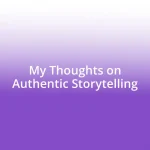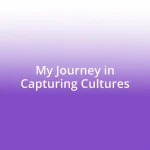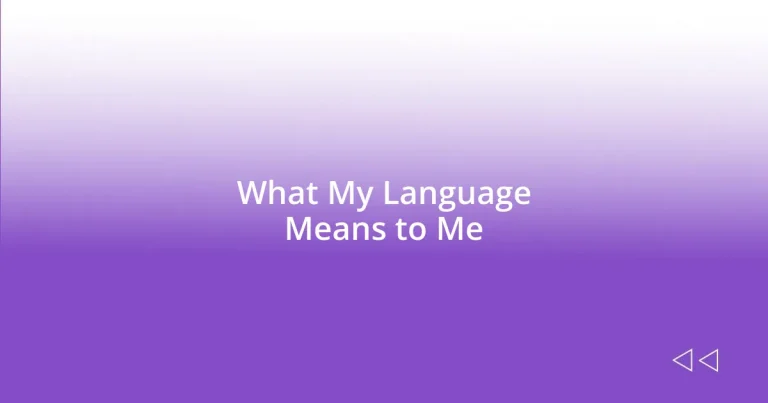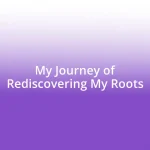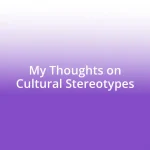Key takeaways:
- Language is a core part of personal identity, evoking emotional connections and a sense of belonging.
- Cultural significance is embedded in language, preserving traditions, rituals, and familial connections.
- Multilingualism enhances communication, offers diverse perspectives, and boosts cognitive abilities.
- The unique expressions in one’s native language can convey complex emotions and cultural nuances that other languages may not capture.
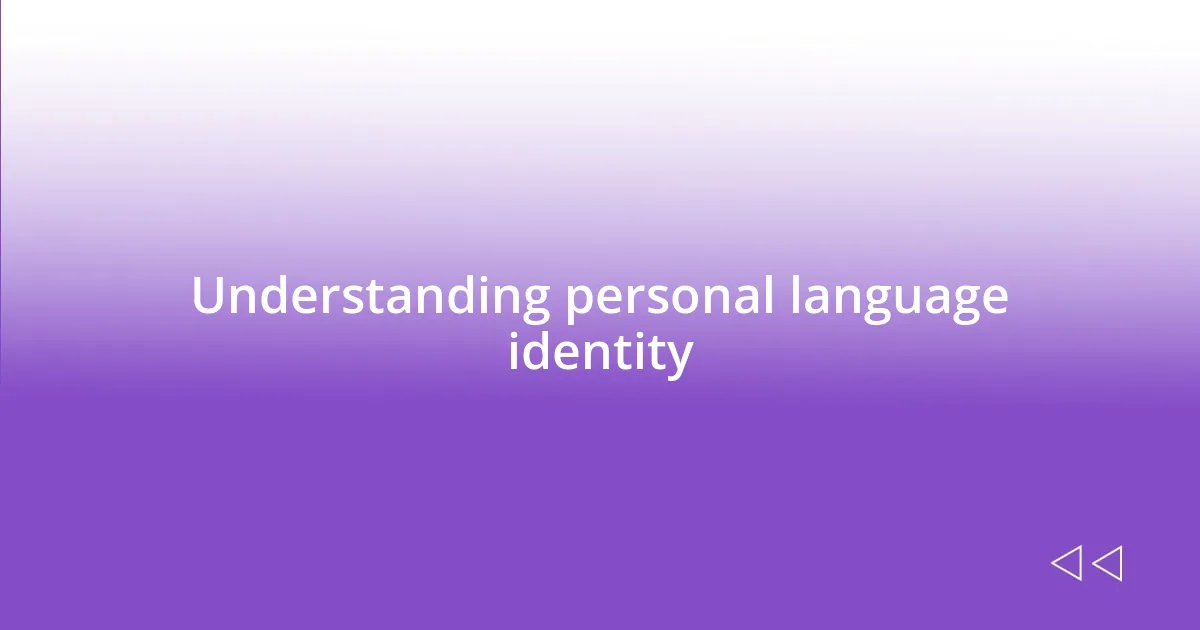
Understanding personal language identity
Language is more than just a tool for communication; it’s a key part of my identity. For example, I remember the first time I spoke my native language as a child—it felt like a warm embrace, as if I was connecting with my roots. Have you ever felt that sense of belonging just by uttering a familiar word or phrase?
As I grew older, I started to realize how my language shapes my worldview. I often reflect on conversations with my grandparents, where their expressions held cultural nuances that English simply couldn’t convey. Isn’t it fascinating how a single word can evoke memories, emotions, and entire narratives from our past?
Every time I learn a new language, I discover a new facet of myself. It’s like putting on a new pair of glasses that allows me to see the world differently. Don’t you think it’s incredible how language enables us to express our unique experiences and perspectives?
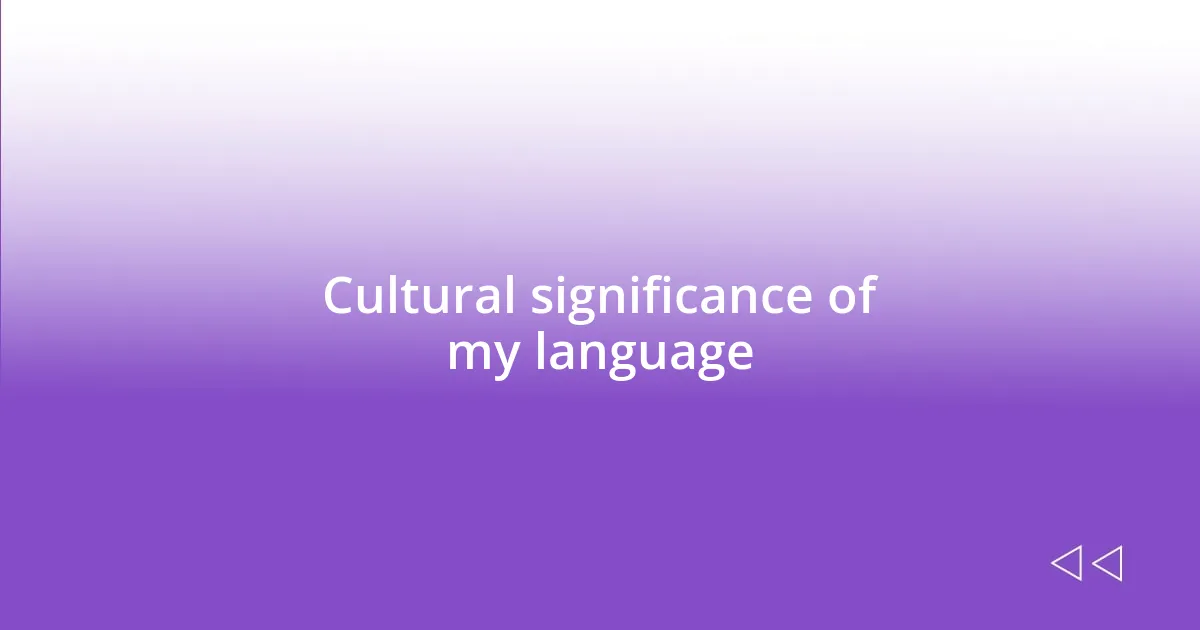
Cultural significance of my language
Language is a living testament to my culture, carrying age-old traditions and tales. I recall attending family gatherings where the language flowed with laughter and stories, each word steeped in history. It’s like each phrase is a thread weaving a tapestry that showcases who we are as a people. This shared language binds us together, allowing us to navigate our cultural identity with pride.
- My language holds sacred rituals and festivals, allowing me to honor my heritage.
- Important life moments, like weddings or naming ceremonies, are celebrated through specific phrases and songs unique to my language.
- When I speak my language, I feel a surge of belonging, as if I’m stepping into a larger narrative woven by generations.
- Understanding cultural idioms reveals deep insights into our values and beliefs, illuminating paths to empathy across communities.
- Often, when I hear a familiar dialect spoken somewhere far from home, it sparks an immediate connection, bridging distances and differences.
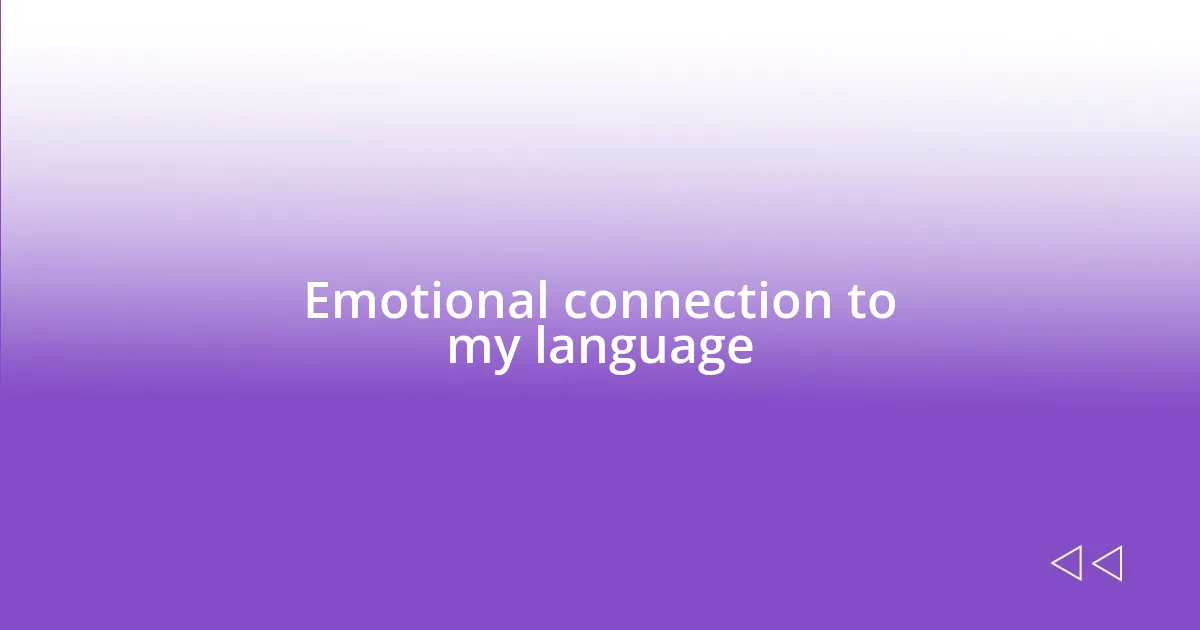
Emotional connection to my language
The emotional bond I share with my language runs deep. I recall a moment when I was struggling to express my feelings in English after a breakup, but when I switched to my native tongue, the words flowed effortlessly, carrying the weight of my heart. It was as if the rhythm and sounds wrapped around me like a comforting blanket, making me feel understood in a way that English couldn’t match. Have you ever had that experience where the right words seemed to find you only when you spoke your mother tongue?
In addition to personal moments, my language invokes a rich tapestry of familial connections. When I hear my mother recite traditional songs, I feel waves of nostalgia wash over me. Those melodies, sung in the language of my childhood, remind me of evenings spent around the dinner table, where laughter mingled with the lyrics. It’s more than just sound; it’s emotion infused with memories—a legacy that I cherish deeply.
Languages also have a unique way of expressing emotions that sometimes remain untranslatable. I think of how a single phrase can embody love, longing, or even sorrow, capturing what it means to be human in ways that other languages may struggle to convey. The moments I’ve shared with my community—those heart-to-heart conversations in our shared tongue—have shaped my understanding of connection. Doesn’t it feel powerful to know that the words we speak can carry such emotional weight?
| Language | Emotional Connection |
|---|---|
| Mother Tongue | Comfort and Understanding |
| Traditional Phrases | Nostalgia and Heritage |
| Vernacular Expressions | Intimacy and Emotion |
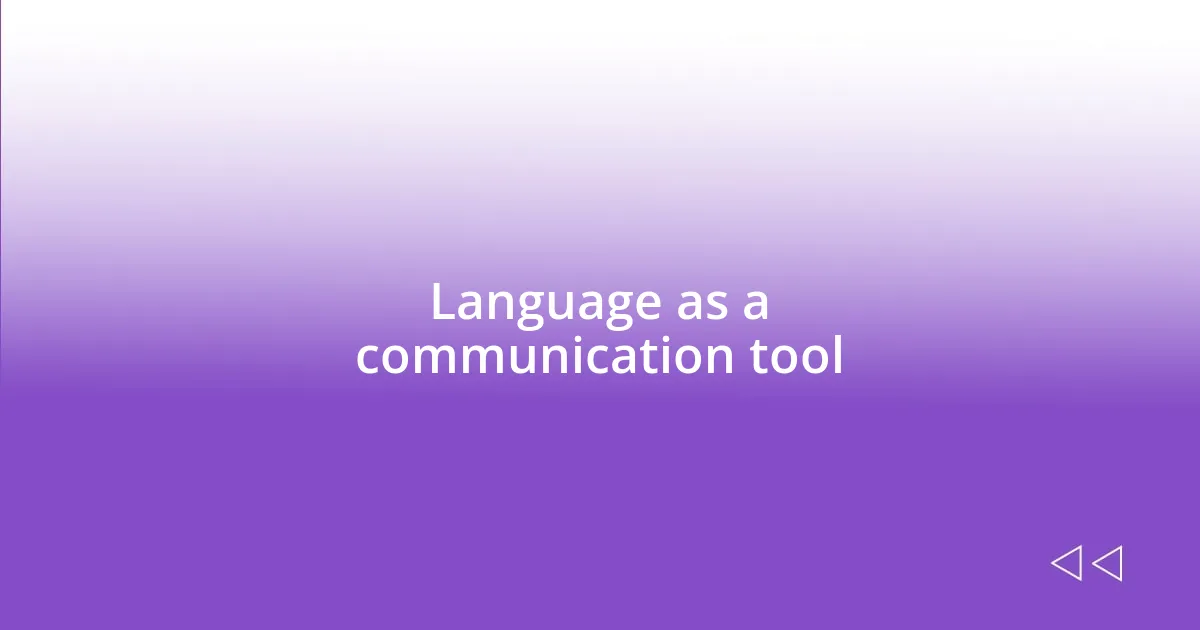
Language as a communication tool
Language serves as an indispensable communication tool in my life, acting not just as a means to converse but as a bridge connecting thoughts and feelings. I vividly remember a late-night phone call with a friend, where she shared her struggles. The moment I switched to my native tongue, I noticed how our conversation deepened. It was as if the language wrapped around our words, allowing us to express empathy and understanding in ways that felt more genuine. Have you ever felt that shift when you switch languages, almost as if a door opens to raw emotion?
Through everyday interactions, language intricately shapes how I convey and interpret emotions. I still think about a heated argument over dinner that quickly faded to understanding when we peppered our talks with familiar expressions. It’s fascinating how certain phrases, unique to my language, can soften a disagreement, turning potential conflict into a constructive dialogue. It’s as if those words are crafted specifically to mend hearts and minds, don’t you think?
Moreover, the versatility of language allows me to navigate different contexts effortlessly. I find it intriguing how a simple greeting can change based on mood or setting. I remember greeting my grandparents with a blend of respect and warmth, while chatting with my friends involves playful banter laden with slang. This fluidity enhances my ability to connect on various levels, making language a vital part of my social toolkit. It’s not just about the exchange of words; it’s about understanding and connecting deeply with people around me.
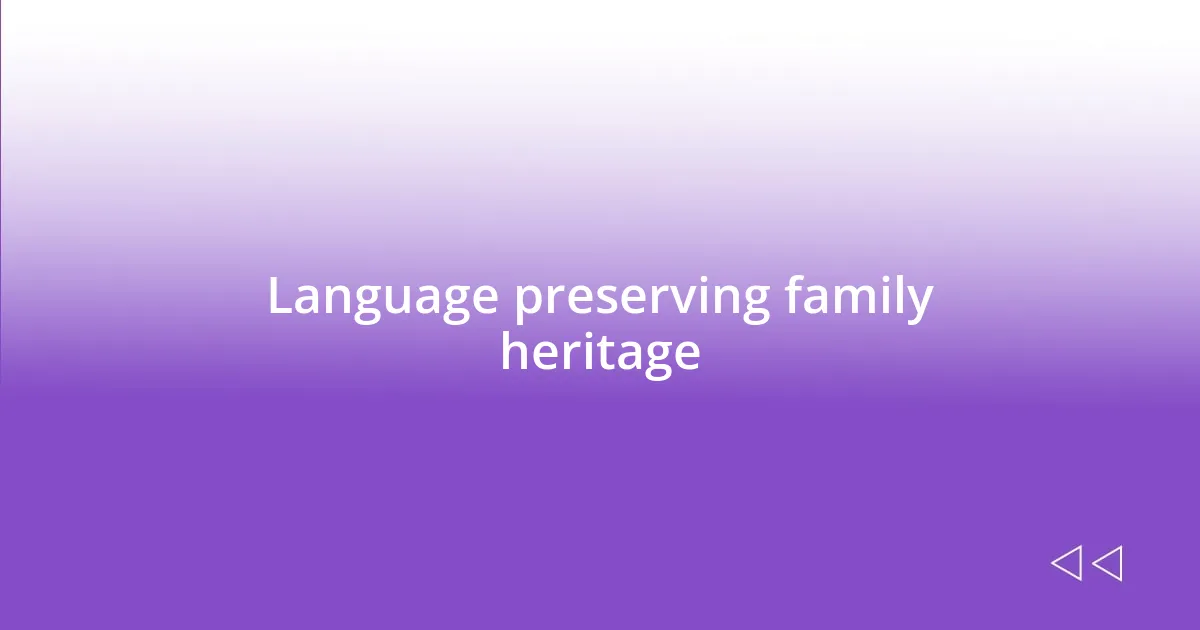
Language preserving family heritage
Language is a powerful keeper of family stories and traditions. I remember sitting with my grandmother, listening to her recount tales from her childhood in her native tongue. Each word she spoke was like a thread weaving the fabric of our family’s heritage together, ensuring that the essence of who we are remains alive. Isn’t it amazing how the language connects us to stories that might otherwise be forgotten?
When I hear my parents speak their first language, it brings a sense of familiarity and comfort. Just last month, during a family gathering, I joined in as they shared jokes, laughing over the nuances that only we understand. That moment felt like entering a world where our roots blossom, giving us a sense of belonging. Have you experienced that warm feeling of being wrapped in your family’s language? It’s something uniquely special.
Preserving our family heritage through language also serves as a reminder of the values that shape us. For instance, the traditional sayings we often use carry lessons passed down through generations. I often reflect on my mother’s favorite expression, which emphasizes kindness and community. Whenever I share that sentiment with friends or even in professional settings, it feels like I’m honoring my lineage and reinforcing the principles that make us who we are. How powerful is that feeling of connecting generations through the simple act of speaking?
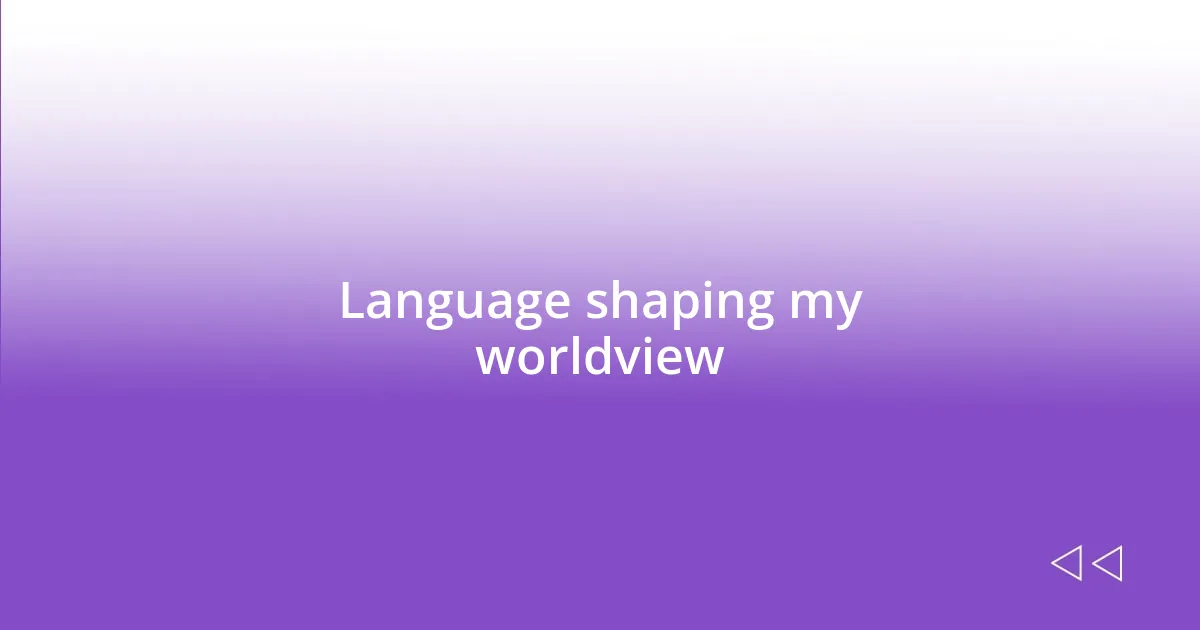
Language shaping my worldview
Language profoundly shapes how I perceive the world around me. The first time I traveled abroad, I had to rely on my knowledge of the local language to navigate unfamiliar streets and cultures. I distinctly remember ordering food at a small café, feeling a rush of excitement as I communicated with the waiter in his language. It wasn’t just about getting my meal; it felt like I was forging a connection, embracing their world through their words. Can you recall a moment when language opened up a new experience for you?
In conversations with others, my language frames my understanding of complex issues. During a community event, discussing social justice in my native tongue allowed me to express passionate viewpoints that might have felt diluted in a second language. I could articulate local nuances and cultural sensitivities that would typically remain invisible. Have you ever noticed how language can illuminate hidden aspects of topics close to your heart?
Moreover, I find that language shapes my very perspective on life. When I reflect on phrases rich with meaning from my culture, they transform how I perceive challenges. For instance, there’s a saying about embracing difficulties as opportunities for growth. Each time I face obstacles, those words echo in my mind, guiding me to approach them with resilience. Doesn’t it feel empowering to have a linguistic compass that directs your thoughts and actions?
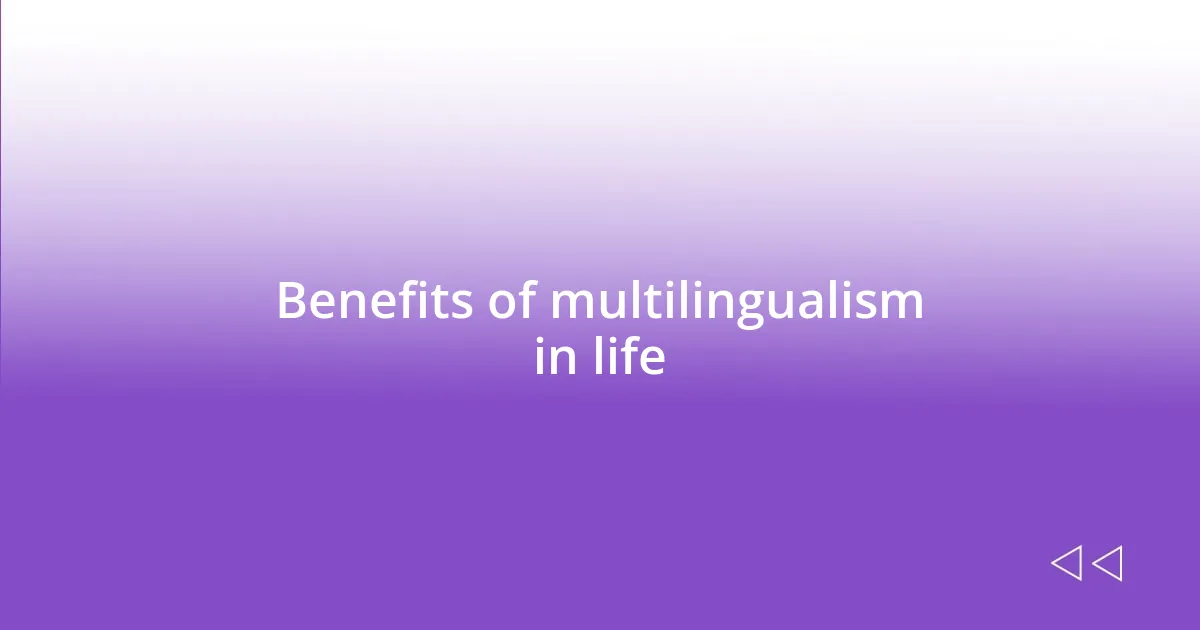
Benefits of multilingualism in life
Multilingualism opens doors to diverse perspectives and experiences. I vividly recall my friendship with a classmate who spoke multiple languages. Every lunchtime was an adventure as we swapped stories about our backgrounds; I discovered customs and traditions I had never encountered before. Can you imagine the richness that emerges when we share stories across cultures?
Additionally, being multilingual has boosted my confidence significantly. I remember standing in front of an audience to present a topic in a language I was still mastering. Initially, I felt nervous, but as I spoke, I tapped into a deep reservoir of knowledge and passion that connected with my audience. How exhilarating is it to communicate across language barriers, forming connections that might otherwise remain out of reach?
Lastly, the cognitive benefits of multilingualism cannot be understated. Research shows that learning multiple languages enhances problem-solving skills and improves memory. I’ve noticed that my ability to juggle tasks and think critically has sharpened since I embraced different languages. Doesn’t it feel great to realize that every new word you learn contributes not just to your vocabulary but also to your overall mental agility?







